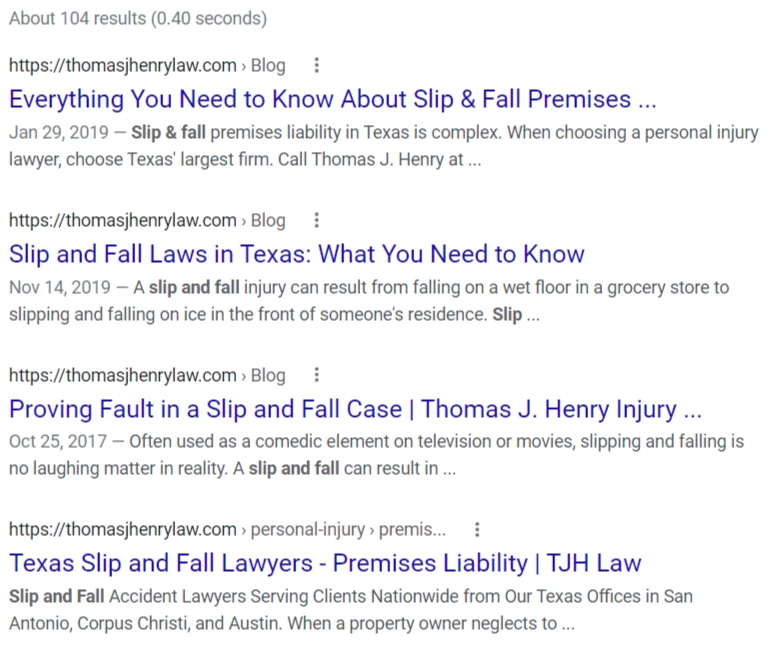Updated: August 13, 2021
How To Use Supporting Pages To Increase Law Firm SEO Page Rank
I’m going to show you a very easy method to organically increase your law firm’s page rank in Google listings. It doesn’t take long, and it’s something you can do right now.
One thing many SEO firms don’t like to talk about is how valuable relevancy is to Google. It’s a simple thing to understand that many search engine optimization firms would rather you didn’t know about.
For example, if your legal practice specializes in personal injury including car accidents, you need to have internal pages dedicated to those keywords.
These are known as supporting pages. And that’s exactly what they do. They support your expertise with authority.
In my personal injury example, you could create four or five additional supporting pages on WordPress. Below are some examples.
- Assault and Battery
- Dog Bites
- Car Accident Injury
- Medical Malpractice
- Slip and Fall Injury
Now with those five supporting pages created, and relevant content added, you would want to link each of those pages to your main Personal Injury page on your site.
On each of those five supporting pages you may want to include a description, common causes and issues, any previous successful cases you’ve won, average costs and rates and even a frequently asked questions section.
You want to fill each supporting page with highly relevant supporting content.
How To Use Google To Determine The Best Supporting Pages For Your Firm
There’s a fun little Google Search trick you can use to determine what supporting pages Google thinks you should have, and it’s easy. Use this on your own site but then use it on each of your major competitors as you should have similar supporting pages.
First, you’ll go to Google.com and run a search on your own site by typing in the word site followed by a colon and finally, the URL. See the example below.

This will run a site search, pulling all Google indexed pages from only the Thomas J. Henry website.
I chose this law firm to use only as an example, as they are well known in the San Antonio region. As a large firm with many active marketing campaigns they have amassed over 2,000 indexed pages on Google meaning they have a huge website.
That’s unusual. On average, a law firm has between 21 and 61 search results, meaning individual pages.
Let’s see what Google has listed as this firm’s most valuable pages relating to slip and falls.
To do this, we go back to our original search and just add the related keywords after the URL.

Hit the search icon, and you’ll see the following results:

From the results, we know that the firm uses a blog to create additional supporting pages and content for itself, which is a good move. We also know that the fourth most popular page relating to our keywords (slip and fall) is on the fourth page, which is not a blog post but rather a complete supporting page full of content.
We can now click into that page and take a look at how this firm has set up their supporting pages.
You’ll want to use a similar setup and content, after all you know it works. But, and this is important, you’ll want to utilize the skyscraper method by creating superior content than the original. This will give you a better chance of stealing your competitor’s valuable backlinks.
If you’d like to see a well-done optimized supporting page, I recommend clicking into the one we found in the example above from Thomas J. Henry. This supporting page is so well organized with highly relevant and targeted content that we’re going to break it down section by section below.
Quick Breakdown Of What Makes A Strong Supporting Page
We’re going to take a minute and examine why the Personal Injury Services page is such a strong supporting page for the Thomas J. Henry website. They did a great job. You can click on the image below to see a preview of the page, or journey over to the page itself by clicking here (opens in a new tab).
Highly Relevant Headings
When a visitor scans the page they are immediately met with easy-to-understand, well-written and highly-target headlines as seen below.
- Texas Premises Liability Attorneys
- Slip and Fall Accidents Lawsuits
- Negligent Security Lawsuits
- Contact The Most Experienced Premises Liability Injury Lawyer
- Your Premises Liability Questions Answered
- What accidents can I claim for?
- Tell us how you have been hurt
Supporting Content
When you glance over that supporting page, it may be hard to believe that there are over 1,200 words of related content. The firm (or, more likely, a hired professional) broke up the content and dispersed it strategically throughout the page itself via easy-to-navigate sections. This ensured readers were not overwhelmed by information.
Related Blog Articles
Thomas J. Henry, as evidenced by the over 2,000 index pages, has been focusing on content marketing for years. While it’s always a good idea to use articles to showcase your expertise, you don’t need to dedicate most of your marketing budget or personal time to content marketing just yet.
My recommendation is more practical. For your personal injury supporting page, you may want to write up a couple blog posts (articles) that relate to the keywords themselves. If you only have time to do one, that’s fine. If you’d rather not focus on articles entirely, you can make that work as well.
Clear Call-To-Action & Convenient Contact Info
Thomas J. Henry has several calls to action on this page, along with two strategically place contact forms (one at the top and one at the bottom). Making it easy to contact you is essential.
Real Results & Social Proof
Two sections dedicated to previous results achieved for clients and another section of testimonials. Thomas J Henry came out strong with the social proof on this supporting page.
After Your Supporting Pages Are Done, It's Time To Integrate Them
Now you’ll go back to your original page, often named Practice Areas. On this page (and possibly in your header and footer as well) you’ll want to add a link to each of your new supporting pages.
This will back up your site authority and provide Google with precious additional data, and you’ll notice an uptick in your main page SEO within just a few weeks.



Building backlinks is often seen as a job to itself and in some ways it can be. But I’m going to walk you through a few actionable steps you can take starting right now to begin your backlinks building campaign and increase your site rankings. Keep Learning >

To dominate locally your business does not need to depend on or even create content. There are other ways to succeed in local SEO. Here are nine you can start using today. Keep Learning >




